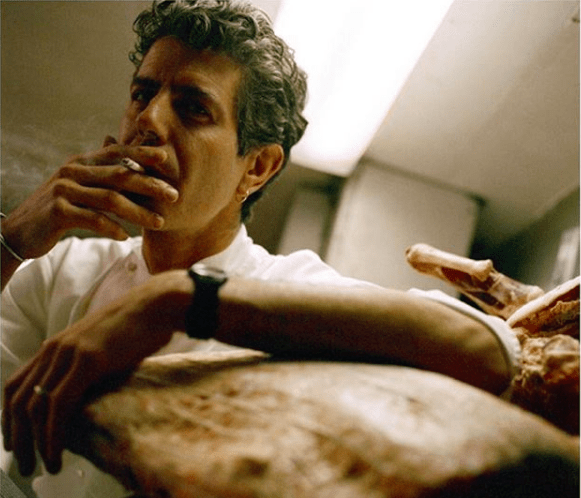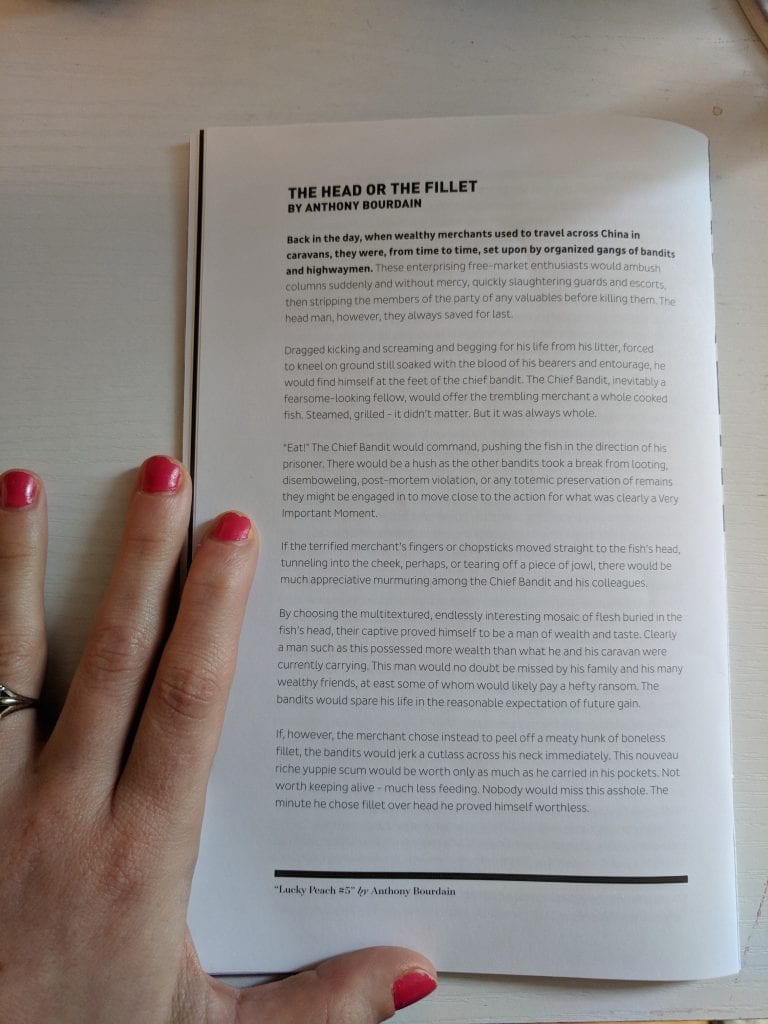You know how they talk about finding your people, your soul tribe? The type of soul tribe Anthony Bourdain belonged to felt like it overlapped with the soul tribe I belong to, if you were to venn diagram it all out. He was my favorite kind of person—so sour and cantankerous and sharp-edged, but he had more heart and intelligence and perception in that quick-witted tip of his tongue than most people can hope to have in their whole bodies. I loved him, and his writing will go down as one of the best of a global American generation.
His suicide was a real punch to so many of our well-fed guts. He represented the type of American a lot of us want to be: Open minded but opinionated, humble but confident, idealistic but realistic, brave in the face of bullshit with a keen eye for spotting it (his rants against Donald Trump’s idiocy were the most recently hilarious/ cathartic). He also, in a lot of ways, represented the type of writer every modern writer wants to be. Bourdain’s style was impeccable, and he was a master storyteller.
I keep this excerpt from a piece he wrote for Lucky Peach #5 at my desk. It’s a perfect example of his ability to tell stories, even when they weren’t his, with humor and heat (which is what, I’m assuming, made him so great in the kitchen too). I’ve kept this piece in my desk drawer for a while now. I pull it out and reread it sometimes, mostly when I need a reminder that even the most basic piece of writing can tell a great fucking story. And it’s better when it does.
That Bourdain no longer is out in this world somewhere, learning, eating, meeting others, means there’s one less good and powerful voice speaking for so many of us. A good and powerful voice that was also incredibly entertaining. God speed, my man.
THE HEAD OR THE FILLET
By Anthony Bourdain
“Back in the day, when wealthy merchants used to travel across China in caravans, they were, from time to time, set upon by organized gangs of bandits and highwaymen. These enterprising free market enthusiasts would ambush columns suddenly and without mercy, quickly slaughtering guards and escorts, then stripping the members of the party of any valuables before killing them. The head man, however, they always saved for last.
Dragged kicking and screaming and begging for his life from his litter, forced to kneel on ground still soaked with the blood of his bearers and entourage, he would find himself at the feet of the chief bandit. The Chief Bandit, inevitably a fearsome-looking fellow, would offer the trembling merchant a whole cooked fish. Steamed, grilled—it didn’t matter. But it was always whole.
‘Eat!’ the Chief Bandit would command, pushing the fist in the direction of his prisoner. There would be a hush as the other bandits took a break from looting, disembowling, post-mortem violation, or any totemic preservations of remains they might be engaged in to move close to the action for what was clearly a Very Important Moment.
If the terrified merchant’s fingers or chopsticks moved straight to the fish’s head, tunneling into the cheek, perhaps, or tearing off a piece of jowl, there would be much appreciative murmuring among the Chief Bandit and his colleagues.
By choosing the multi textured, endlessly interesting mosaic of flesh buried in the fish’s head, their captive proved himself to be a man of wealth and taste. Clearly a man such as this possessed more wealth than what he and his caravan were currently carrying. This man would no doubt be missed by his family and his many wealthy friends, at least some of whom would likely pay a hefty ransom. The bandits would spare his life in the reasonable expectation of future gain.
If, however, the merchant chose instead to peel off a meaty chunk of boneless fillet, the bandits would jerk a cutlass across his neck immediately. This nouveau riche yuppie scum would be worth only as much as he carried in his pockets. Not worth keeping alive—much less feeding. Nobody would miss this asshole. The minute he chose fillet over head he proved himself worthless.”


